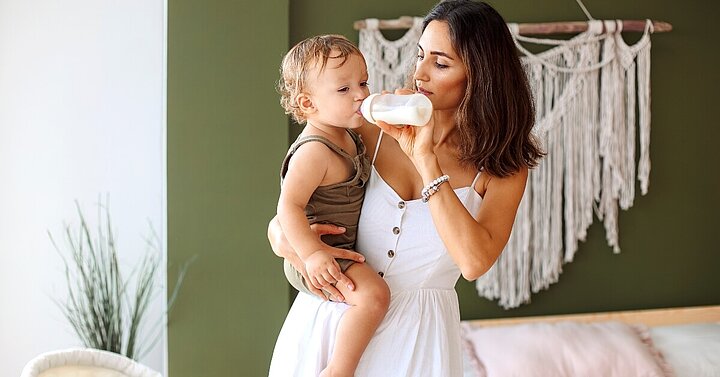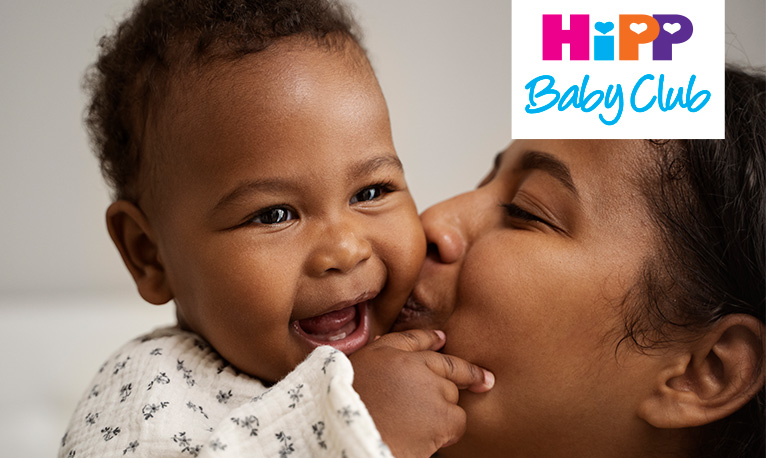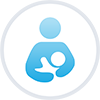Milks and Other Drinks for 9 Month Old Babies

As your toddler's diet expands, milk begins to give up its starring role - but offering healthy drinks is still important.
It’s not unusual for little ones to go off their milk somewhat during toddlerhood. After all, once they’ve discovered the wonderful world of food, there are lots of other exciting options to try instead!
How much milk?
When your toddler was younger, milk was a vital source of energy and nutrients to fuel healthy growth and development. However, as toddlers' diets become more varied, nutrients and energy are provided in other ways, so they need less milk.
Milk is still an important part of your toddler’s diet, though - it provides them with valuable protein, energy, vitamins and minerals such as calcium. Aim to give your toddler about ½-3/4 pint (360ml) each day – if he or she won't drink this amount, try to give other dairy foods such as yogurt, milk on cereals, cheese, custards and sauces to make up for it. Ideally, your toddler should be having 3 portions of dairy foods per day, either at mealtimes or as snacks.
To give active toddlers an extra boost, many parents give them a Growing up milk tailored to their nutritional needs, rather than ordinary cows’ milk. This is an especially good option for fussy eaters, who often don’t get enough iron in their diets.
Learning to drink from a cup
It's quite common for toddlers to be quite attached to their bottles and not want to use a beaker or cup, but it really is best to make this switch as soon as you can manage it. Drinking from a cup instead of a bottle is much kinder to little ones' teeth, because it decreases the time that the milk spend in your child's mouth. If milk pools in the mouth for a long time, bacteria to convert the natural sugar it contains into acids that cause tooth decay.
You could try your toddler on an open cup straight away, or you might prefer to use a trainer cup or beaker to get your child used to the idea of drinking this way first. You'll soon find that there's a bewildering variety of beakers, lids and spouts to try, and you may find yourself buying more than one type before you find the one that suits your toddler best. Persevere, though, and it will be well worth it!
Cow's milk
Toddlers can have cow's milk as a main drink once they are a year old, although cow's milk doesn’t provide as many key nutrients as a formula milk that is suitable for their stage.
Once your toddler is 2 years old, you can switch to giving semi-skimmed milk if you like. Fully skimmed milk isn't suitable as a main drink until your child is five years old, because it doesn't contain enough calories for a growing child.
Other drinks to offer
Your toddler might want around 6-8 small drinks a day, perhaps more if the weather is hot.
Between meals, water or milk is the best way for your little one to stay hydrated, although it’s best not to let them have too much liquid – it can fill them up too much and leave less room for them to enjoy food.
At one or two mealtimes you might like to offer diluted fruit juice to your toddler. Fruit juice contains vitamin C, which helps the body to absorb any iron present in the meal they’re eating. If your toddler isn’t keen on drinking water, you can offer diluted fruit juice first, and then gradually make it more and more diluted.
Sugary drinks such as squash can harm your baby's teeth if you give them between meals or too often. If you do offer squash, it's best to dilute it well and give it at mealtimes only.
Looking after your toddler's teeth
A good toddler dental routine looks a lot like an adult's: teeth need to be brushed twice a day, in the morning and last thing before bed.
Using a small, soft toothbrush with a pea-sized amount of children's fluoride toothpaste, brush your child's teeth using small circular movements, front and back. You might find it helpful to set up a mirror so your little one can see what you are doing.
It's also a good idea to get your toddler used to going to the dentist for a check-up as soon as possible. Start off by bringing your child with you for your check-up so they can get used to the environment - dentists try hard to make children feel comfortable, and there may even be bonus stickers on offer!


